The World Tourism Organization expects travel to reach pre-pandemic levels this year and intel shared by luxury travel advisors and supplier executives at Signature Travel Network’s 2023 Sales Conference in Las Vegas supports that prediction. To learn more, Luxury Travel Advisor moderated a panel at the conference where we learned that despite the crowds, pricing and air travel woes, people have never been more determined to travel. Increasing interest in multi-generational travel, indigenous experiences and secondary destinations were some of the trends highlighted.
Participating in our conversation were Aimee Price, head of sales, North America, Explora Journeys; Christine Smith, senior travel advisor, Global Escapes; Claudio Nielsen, vice president, Delta of Scandinavia; Dalia Gibu, regional sales and marketing director, Abercrombie & Kent South America; David Tobin, owner and CEO, Dream Escape; Jonathan Alder, luxury travel planner, TravelStore; Michelle Crews, co-owner, Elevations Travel; Paul Tomasch, founder, ICS Travel Group; Victoria Batten, regional director of global sales, Langham Hotels and Resorts; Wendy Taylor, luxury travel advisor, Preferred Travel & Company and Ignacio Maza of Signature Travel Network. Following is an edited and condensed version of the conversation, which was moderated by Matt Turner, editor, Luxury Travel Advisor.
Matt Turner, Luxury Travel Advisor: For the suppliers here, how did you manage the demand in 2023?
Paul Tomasch, ICS Travel Group: We had some very loyal staff who came back to us [after COVID], so we were OK. They’re all extremely busy now, and everybody’s very delighted that the business is back. They’re working hard and we’re trying to find more people, which is not that easy.
When it comes to demand for hotels, every country is fine except for Japan. My problem is not the hotels, it is transportation and the guides. Many of them left to do something else and they need government licenses to operate.
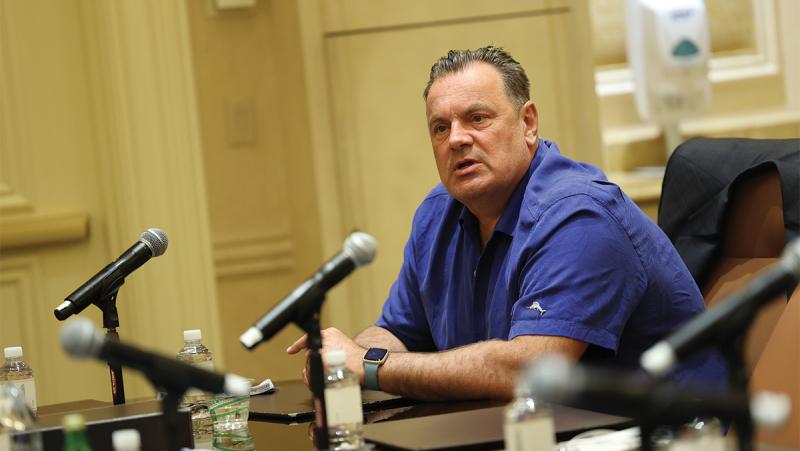
Aimee Price, Explora Journeys: That impacts the cruise sector, as well. From the destination experience, we’re having issues finding transportation to and from the ship on pre- and post-destinations as well as when it comes to our destination experiences. We’ve been trying to find something unique and differentiated in comparison to the other lines and, when doing that, it’s taking exorbitant amounts of time to try and get those RFPs back and find that right provider because the pool has shrunk so much over the time.
Paul Tomasch, ICS Travel Group: For the most part, American travelers go to the same places. If they would spread out more to other parts it would be fine, but it’s Tokyo, Fuji, Kyoto — everybody wants to go at the same time, and that’s the bottleneck.
Jonathan Alder, TravelStore: There are a lot of countries that have been dealing with a problem of over-tourism and Japan announced its official plan is to get people to consider Kanazawa, Takayama, Fukuoka and areas like Aomori, which is amazing and is off everyone’s radar.
I’ve been to Japan about 50 times, and I still have not seen all of it. Yes, we’ll do Tokyo and Kyoto or Osaka, but let’s do three or four other places on top of that. This not only helps with that bottleneck but also helps with employment throughout the country because what about those guides who are government-licensed in all these other areas and how you’re contributing to their benefit? Plus, you’re showing clients some amazing places that their friends have never heard about.
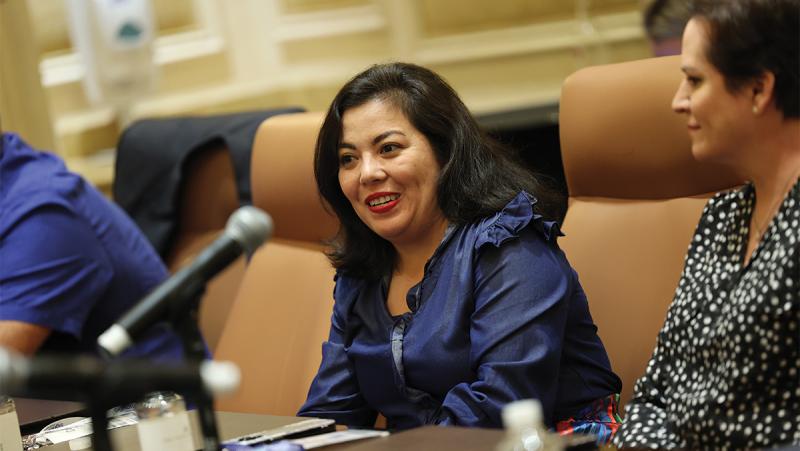
Dalia Gibu, A&K South America: During the pandemic, we decided to reduce the time that we were working to about 50 percent to keep everybody, because the guides are so knowledgeable and we knew that when tourism came back, we would need those people. We started educating them and giving them lectures on different subjects. So, that time was to grow our relationship with them, to keep them loyal. Now they prefer to work with us because we kept by their side during the hard times. In some destinations, like Machu Picchu, it’s tough because you have a lack of staff, but you also won’t want to overpopulate it. So, it’s about offering travelers different experiences around South America. It’s sometimes a little bit difficult because some destinations are off the beaten path and people can be afraid to go, but that’s our job: to educate them on new places to enjoy the other wonders of South America.
Claudio Nielsen, Delta of Scandinavia: We kept everybody on board when COVID hit. We were 11 people when COVID arrived and now we’re 35. So, in three years, that shows the popularity of our destination. Of course, we did have challenges keeping up because the first thought was to keep up the quality of the replies and the quality of the service that we provided to the advisor. We mostly had issues with the bigger hotels. Where we operate, many suppliers are family-owned businesses, they’re small. So, they did not suffer as much from a lack of staff; they always had the same people. The moment we went to bigger hotels or bigger companies, we did have some issues, even if it was a five-star hotel.
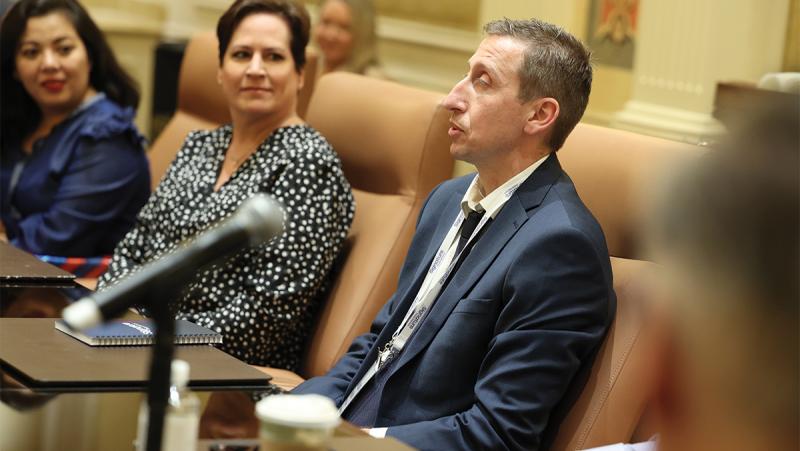
David Tobin, Dream Escape: In 2022, we stopped selling for about two months. We couldn’t get answers from hotels, we didn’t have enough staff. We were being asked for things and people wanted a quick turnaround. The pricing was crazy, and we were just going to let down our existing clients by taking on new clients. Then they had gone to other partners who took on the program and it all fell apart because they couldn’t get the space that they needed; they couldn’t find the guide, they couldn’t find the driver, and then they had to try and fix that. So, it was a tough decision to make, but then people came back to us after and said, “Thank you for not taking it on because we realized that you would’ve let us down and we didn’t want that to ruin our relationship.”
Some hotels were only selling 60 percent of their inventory because they didn’t have the staff to fill it. And because they were selling from the top down, it was pricing some clients out. There was also this huge lack of supply because no cars were coming into the U.K. Then, when there were cars, there weren’t guides or drivers that were capable, and rates went up maybe 60 percent.
Victoria Batten, Langham Hotels and Resorts: The hospitality industry has been greatly affected by COVID. Lots of people realized that they could go and earn higher salaries in different industries; sales and marketing, especially, has proven to be very difficult to find talent. As an industry, we need to show young people why they would want to work in a hotel or in a restaurant. But they’ve all seen how risky it can be to have your livelihood attached to the hotel business. In terms of Langham Hotels, we were fortunate that as soon as the business started to come back, we started recruiting again, and we have been fully staffed. We’ve prioritized getting back to people quickly and that’s how we’re winning the business — by being quick. But I think it is a systemic problem that we need to fix in promoting hospitality more as a great industry and a place to be as a proper professional career.
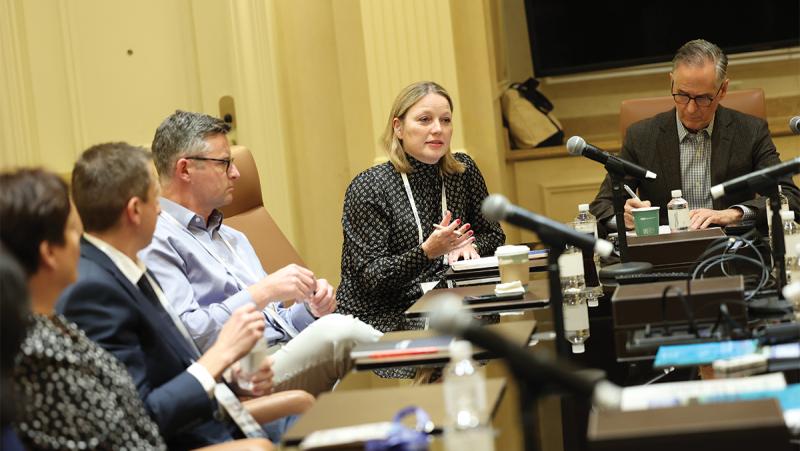
Matt Turner, Luxury Travel Advisor: Turning to the advisors, what are you seeing from your clients as far as bookings for 2024?
Michelle Crews, Elevation Travel: We’re seeing that our clients are not only planning their main trip, but they’re planning all the trips that they want in the next year and a half. And, for cruises, we want to make sure that they have those top suites or the penthouses, so they are booking far, far in advance. They’re also booking several trips at a time — especially multi-generational families because they want to make sure something is on the books for all the holidays.
Christine Smith, Global Escapes: Clients who traditionally have booked somewhat last-minute now have this fear that if they don’t plan it, they won’t get to do it. Time has become very precious in a very tangible way to people. Even the clients who plan well ahead but one trip at a time have now planned their trips for the next five years and anything possible to get under deposit now is under deposit. I’m also seeing a willingness to spend up to have the experience that they really want, and not cut corners in as many ways. They’re staying longer and they’re going for a little bit more of an upscale experience.
Matt Turner, Luxury Travel Advisor: For the clients doing the longer trips, are those more destination-immersive or are they visiting multiple destinations?
Christine Smith, Global Escapes: Both. I’m seeing clients slow down and cover a smaller footprint, but if they want to go from Point A to B and do all the things in between, they’re spending more time on the trip so that they can have the time in each place. There’s very much a resistance to rushing around and missing things. They don’t want to miss anything.
Wendy Taylor, Preferred Travel & Company: I’m seeing the same thing that Michelle and Christine are seeing with the booking trends skewing further out. Some of my clients — a lot of whom are older and retired — had trips booked for ’22 and ’23 that were a little bit more active. They are now saying, “Oh, I’ve got to get to the rest of these active destinations on my list.” Those are the trips they’re starting to book. It’s not necessarily going to Europe or going on a cruise; it’s New Zealand and they want to do some hiking, it’s Antarctica, and it’s “I’ve got to do this now and I’ve got to get it on the books.” I’m also seeing a lot more immersing in one destination and slowing down and making less of a footprint.
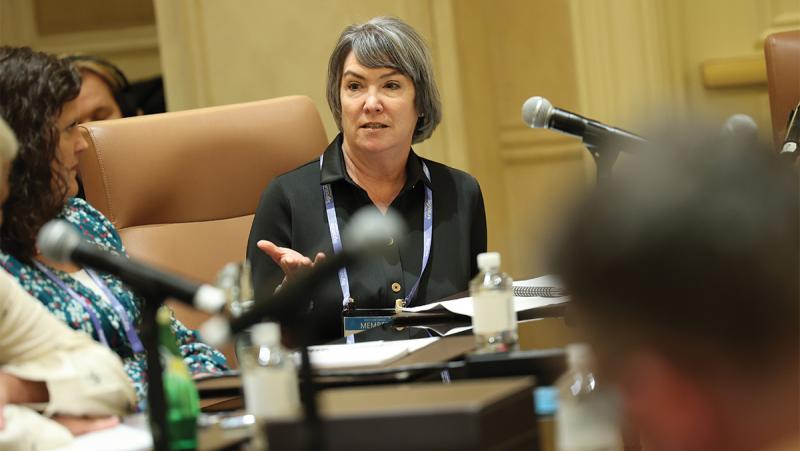
Jonathan Alder, TravelStore: We have seen more advance bookings than we used to get, but I’m working on trips that are for this month that we started about a week and a half ago and haven’t been deposited yet. Our business has been as much last-minute as we always had, so it’s about finding alternate destinations. It’s also pitching that the world — especially the higher end of travel — isn’t that far. When I used to live on the West Coast, I’d go to Europe for a weekend and come back. If you’re flying in first or business class, it’s not that bad to go for three or four nights. Some destinations to consumers might sound far but may be closer than they think. One example is L.A. to Puerto Rico takes about 12 hours door-to-door; L.A. to Papeete takes eight hours. Just because it sounds more exotic and it sounds farther, could that be a really good alternative for you?
Matt Turner, Luxury Travel Advisor: When suggesting these alternate destinations, how do you have that conversation with your client?
Jonathan Alder, TravelStore: When I start with a client, we don’t usually talk about where they want to go. We talk about what they’re looking for — are they looking for nature, city, adventure, the beach? Give me your general subject and then let’s go through a million destinations that fit that and the timeframe you want to go. When I hear, “I want to go to Hawaii,” I think, “Great, you’re looking for a beach.” Now let’s talk about what beaches are good, where you’re going and what brings you the most value. Something I’ve always said to clients is we love expensive, we deal with expensive, we sell expensive, but we hate bad value. So, where is a good value? I don’t care if it’s “cheap,” but I hate if something is, say, a three-star hotel for $3,000 a night.
Matt Turner, Luxury Travel Advisor: How has the traveler changed from before the pandemic, or even compared to last year?
David Tobin, Dream Escape: Carpe diem. The runway has gotten shorter. In the U.K., people aren’t buying brand goods; they’re not interested in investing in them. They’re investing in the things they’ve missed. They want to be based somewhere and immerse themselves in a destination. A lot of people think that they’re going to get to Ireland once in their life, they’re going to get to Scotland once in their life but they will come to London a million times. We need to replicate the Italian model — people go back to visit different places and they love it for that reason. We’ve just got to educate them: Rather than just going to Dublin or the West Coast, how about going to Donegal or County Antrim not as a bolt-on but as a trip itself?
Aimee Price, Explora Journeys: I think in the cruise space we’re starting to see a trend of people looking for something more than the traditional cruise experience, which is your “I-have-to-be-here-at-this-time, I-have-to-be-there-at-that-time, I’m-going-to-be-in-a-small-space.” What we’ve done by providing guests with more space, more choice, focusing on design and being more contemporary is bring a new cruiser to the industry. We have seen traditional cruisers get on our ship and want us to be something that we’re not. But new cruisers who have come from the luxury hotel space say, “Wow, I had no idea that you could have this kind of experience on the water.” So, we’ve seen a shift in the type of person that’s coming to our brand from a cruise perspective. The advisors that we’ve connected with have found that refreshing because it’s given them a new option to put in front of some of those hotel guests who may have never seen cruise as an option.
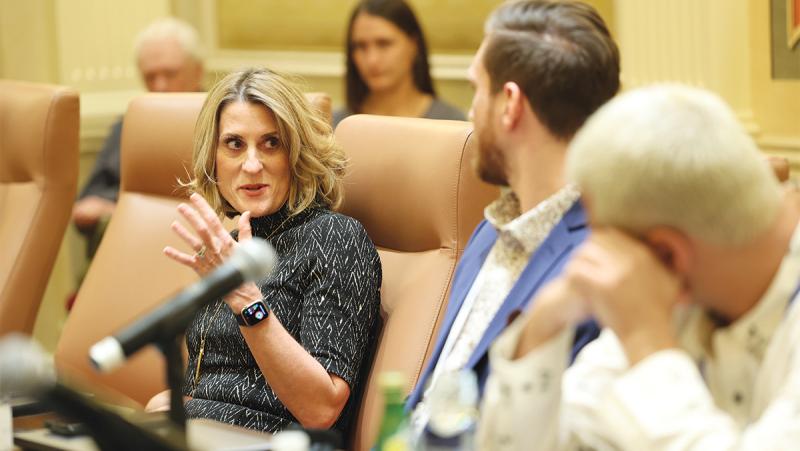
Jonathan Alder, TravelStore: Every agent in here has heard that “Cruising is not for me” or “I hate cruises.” And the next question I ask is, “Have you ever taken a cruise?” Saying to me that you hate cruises is like saying you hate hotels. “I stayed at a Motel 6 once; all hotels are horrible.” There is a cruise for absolutely everyone. Some people are expeditious, some people want Vegas at sea, some people want a small luxury yacht, but there’s something for you in that market. There are so many destinations that are much better by land and yet cruises offer them, but there are also a lot of destinations that are far better by cruise that you can’t access otherwise. To do Norway well, you need a boat. Alaska is, obviously, another top market, as are the Caribbean islands and Greek Isles. Some of my favorite spots I’ve ever been to don’t have a luxury hotel if they even have a hotel at all.
Aimee Price, Explora Journeys: The other thing the cruise industry has done is alienate themselves from the land operators and hotels, saying, “Just take a cruise.” We certainly don’t have that in our DNA. We would rather partner with Langham and have them spend five, six, seven nights on land before or after their journey. And I think that’s resonated with some of those non-traditional cruisers that we’re trying to attract.
Wendy Taylor, Preferred Travel & Company: A lot of my clients are now more open to where I suggest they go. They say, “You know what I’ve done, so what can I do? My friends went to Italy and it was so crowded. What else can I do?” And that has been a real joy for me to be able to bring my expertise, my supplier’s expertise into that conversation, where I felt like pre-COVID they weren’t so open.
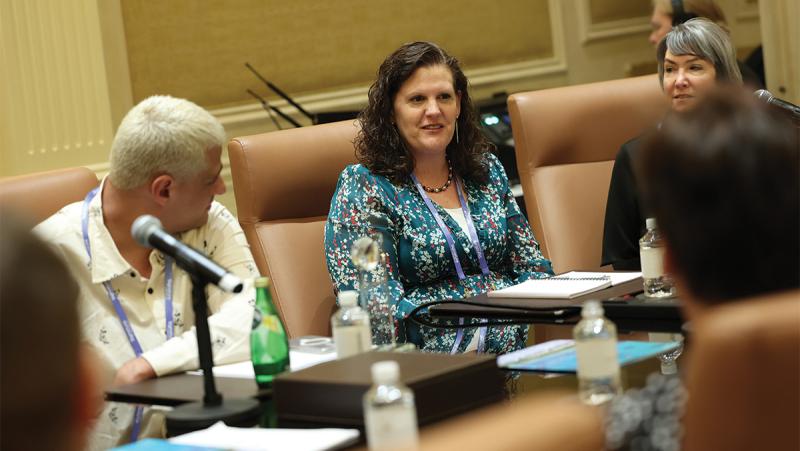
Christine Smith, Global Escapes: I’m seeing that very specifically in terms of when to go. Even if they want to visit somewhere that is typically quite crowded, I’m seeing a great desire to visit in the offseason. If they’ve never been to a destination and they really want to see it, they’ll come to me with much more flexibility than they’ve ever had and say, “You tell me when to go and that’s when we’re going to go” to have the experience that they see in their mind.
Claudio Nielson, Delta of Scandinavia: What we see up north is that the travelers are really moved by the experience. Do they want the five-star hotel? Yes, they do, but it’s more about the experience now. They also want to share that experience. We’re seeing a lot of multi-gens who need to stay in an exclusive place, with the whole family and the people they care about altogether.
Victoria Batten, Langham Hotels & Resorts: It’s also the continued personalization of these experiences. They want to have something that makes them feel like the VIP in the hotel, that this has been curated for them. To that point, we’re finding a lot of demand for our Club Lounge proposition. It’s not only the value of the additional food and beverage, but it’s more exclusive and the team really has an opportunity to build a rapport with those guests. It’s very personal and tailor-made.
Paul Tomasch, ICS Travel Group: In the three years when we were closed, I think people were reading too many magazines and watching too much TV; they came back with a shopping list, “I’m going for 10 days, and I want to go to Korea, Japan, Taiwan, Philippines and Thailand.” I said, “Why don’t you slow down and maybe look at one or two of those destinations?” In the past, there was a lot of discussion about hotels (with clients) but, nowadays, probably 10 percent of the discussion is about hotels and 90 percent is experiences. People do not care that much where they stay if it fits in the budget, the picture looks good and we recommend it, but they really care about the experiences; the list of questions and of suggestions that we get for a certain destination is larger than ever before, which is good because people are showing interest in the destination. People know what they want and, for us, it’s very nice if we can deliver what they’re looking for. But at the end of the day, the experiences are the big factor right now.
Dalia Gibu, A&K: I see more active people. I don’t know what happened during COVID; I think everybody was exercising at home and now I’ve received so many requests for the Inca Trail, Patagonia and Cotopaxi in Ecuador. They want a challenge, they want that Instagrammable place like the Rainbow Mountain in Peru. And then something I love seeing is positive-impact travel and giving back to the community. They want to experience a day with a community in the Sacred Valley, they want to go to Rio but also learn about our philanthropy project. It’s great that people are not just thinking about their own enjoyment, but they want to leave something positive in our destinations.
Matt Turner, Luxury Travel Advisor: Is there any interest in indigenous travel and experiencing those communities?
Dalia Gibu, A&K: We’ve been working with a local community in the Sacred Valley for about nine years. So, instead of taking our clients to the busy local markets, we take them to spend a day with the community. We do a trek with llamas and alpacas, but we learn about the community, the textiles, everything that is important to them. It also benefits the women who now have their own permits, so they can earn their own money, make their own decisions and send their kids to school. And, for 80 percent of them, we took them to Machu Picchu for the first time and they live next door.
Matt Turner, Luxury Travel Advisor: A survey that we conducted showed that more than half of advisors said that their clients have some interest, at least, in sustainable practices or sustainable initiatives while they travel, but much fewer than that were actually booking those types of experiences for their clients. Do your clients have any interest in ways that they can actively participate in a sustainable experience?
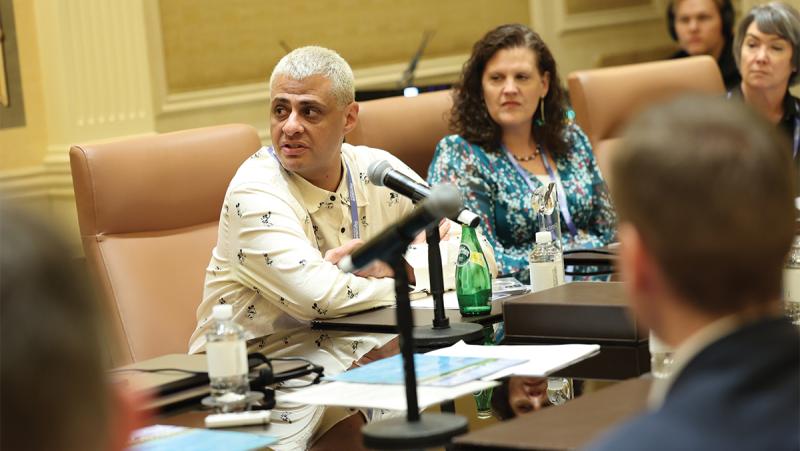
Jonathan Alder, TravelStore: I haven’t seen the comments from clients as much as I would like, but the environment is a really important issue to me. So, we try to steer them in the right direction. For example, Hertz has a large electric fleet, so when someone asks for a rental car, I rent them a Tesla. A lot of them got there and yelled at me, saying that they didn’t know how to drive it, but their kids taught them in about five minutes. It’s getting them through that phase or talking about certain destinations and hotels and their practices and using that as part of the sales speech: Look, it’s carbon-neutral or it’s carbon-free. One that I like to bring into the conversation is The Brando and how it is totally carbon-free, down to the 3,000-foot-deep seawater being pumped up for air conditioning. This becomes part of the interest in the product, even though that might not have been something the client initially thought of. Advisors should be bringing that consciousness to the forefront without clients having to think of it first.
David Tobin, Dream Escape: I do wonder if self-regulation jumps in. If you switch categories and go into drinks, where they had an issue with responsible drinking; Diageo said, “We are going to regulate ourselves before governments regulate us.” They launched “Drink Responsibly,” which is on everything that they put out there. If, at the high end of luxury, people start to self-regulate and they all report in the same way, then everyone else follows.
Victoria Batten, Langham Hotels & Resorts: There’s a body called EarthCheck where hotels must show all the activities that they’re doing and then they get awarded a certain mark. So, you can see how sustainable hotels are, but we probably need to do a better job of communicating that.
Ignacio Maza, Signature Travel Network: Some countries are taking a leadership position in this arena, like Costa Rica. They have this program that everybody aspires to as a standard. Hotels can earn up to five leaves depending on how socially responsible they are and then use it as part of their marketing. But the country is doing a phenomenal job in terms of conservation, in terms of being socially responsible, in terms of bringing back forests that were farms and cattle ranches. That has made them very successful.
Aimee Price, Explora Journeys: We hear constantly that we should be telling more of our sustainable story because it is so incredibly strong. When anybody comes on board our ships, they’re astounded to see the substantial amount of space dedicated to our MSC Foundation to tell not only the story of what MSC is doing but also what we as a brand are doing as part of that initiative. We’ll be one of the first lines that will have LNG power as well as hydrogen power on our subsequent ships. We have no single-use plastics on board. In luxury, one of the things we try to do is personalize the experience, but we had clients who expected their fridge to be stocked with Fiji Water because that’s all they drank. We said, “I’m sorry, we can’t do that because they come in plastic bottles.” Educating them on why they couldn’t have Fiji Water in their suite was something very simple but once they understood, they accepted it.
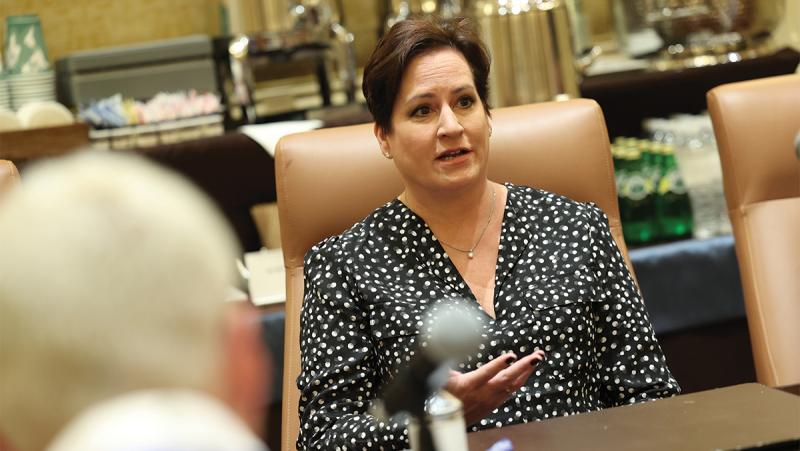
Michelle Crews, Elevations Travel: I agree that there’s a big disconnect between what advisors know and what’s out there. We’ve got a lot of Boomers and older Gen Xers among our clients and that’s really not on the radar at the moment — and it could be if we knew more. If there was somewhere that we could go to learn more about this, then we could teach our advisors and then they could go and tell the clients there’s a different way to do things and it still could be luxury.
Christine Smith, Global Escapes: One thing that I think has been helpful for me to move the conversation in this general direction is the work tourism boards have done to highlight indigenous cultures and how valuable they are to the destination. The destinations that come to mind immediately are Australia and New Zealand. While it’s a different topic, it does go hand in hand with sustainability. Do any of these cultures depend on sustainability to continue to thrive? Cultural immersion is definitely something that people have begun to want, even if they’re not really interested in sustainability; they have heard a lot about cultural immersion and cultural appreciation and they’re at least asking about it. I find that’s a good segue to this topic and to have a more well-rounded conversation about their trip as a whole.
Matt Turner, Luxury Travel Advisor: I’m glad you brought that up because, obviously, at the forefront of sustainability is eco-friendliness, but it also consists of sustaining livelihoods and communities and that’s exactly what ties into indigenous tourism.
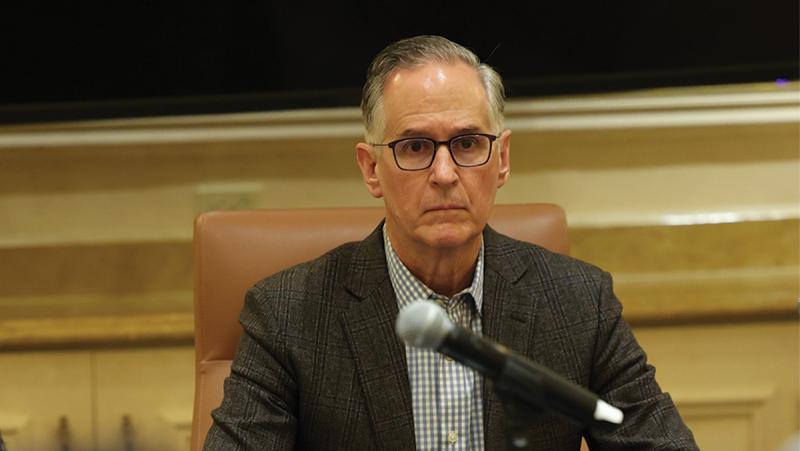
Claudio Nielsen, Delta of Scandinavia: In the countries where we operate, sustainability is not a new concept. It’s well-educated in society, so much so that if we made a mistake it was that we took it for granted. So, we didn’t communicate when something had a high level of sustainability, but now when we send out offers to our advisors, we highlight when something is sustainable. We put a little green symbol and then we give a little explanation of why we are marking that as green. It’s us doing that; it’s not an official certificate, but it may, for example, include biking in Copenhagen or meeting the Sami in Sweden.
We started during COVID; we were not so busy and since we had more time, we thought we should do something like this. When we select a hotel, activity or supplier that has some sustainable initiative that we want to show to the partners, you can click on the green symbol and see the explanation for why we are branding this a sustainable service. And we do see this impact decisions, especially when it comes to the choice of hotels, which is very nice.
Ignacio Maza, Signature Travel Network: It has been our experience that when we add a component of giving back to the community, it enriches the trip and it, many times, becomes the highlight of the trip.
Related Articles
Virtuoso Shares Nine "Must-Have" Experiences for 2024
Regent Sales Execs Talk Sales Initiatives and Trade Programs
Luxury Travelers Seeking Insider Access to Destinations
SmartFlyer Gathers Advisors in London for Annual CORE Conference